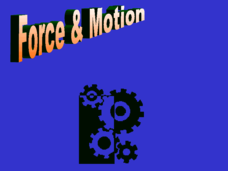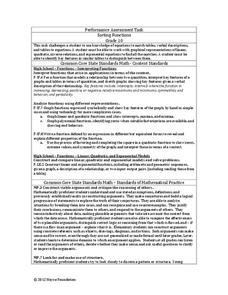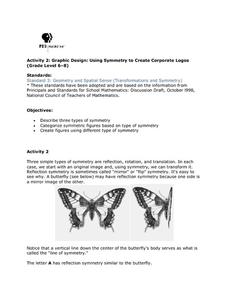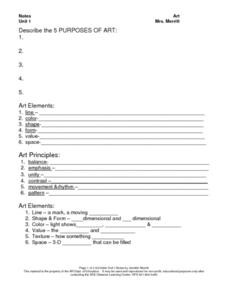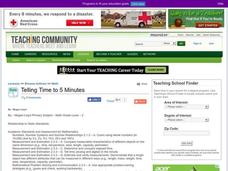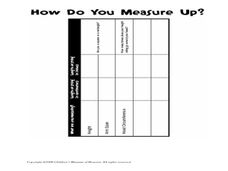Exploratorium
Touch the Spring
Concave mirrors and the images they produce are traditional topics in the physics classroom. This resource explains how to set up an investigation of them, and it provides you with the explanation of concepts.
Curated OER
Force and Motion
Each of the slides here gives a definition, equation, or calculation example for a component of force and motion. This large collection covers topics from momentum and Newton's laws to centripetal forces and simple machines. Animations...
Curated OER
Unit II Worksheet 4 - Constant Velocity/Motion Maps
This is a smart approach to displacement concepts. Physics learners analyze a motion map and then draw qualitative graphs for time versus displacement and time versus velocity. Get your class thinking critically through the use of a very...
Royal Geographical Society
An Introduction to Maps
First graders are introduced to a variety of maps such as globes, street maps, atlases, and different types of floor plans. The focus of the lesson requires individuals to create their own plan of the classroom using the PowerPoint...
Inside Mathematics
Sorting Functions
Graph A goes with equation C, but table B. The short assessment task requires class members to match graphs with their corresponding tables, equations, and verbalized rules. Pupils then provide explanations on the process they used to...
Film English
Paper Is Not Dead
Now that much of people's lives center around their electronic devices, paper is being used less often. However, sometimes you do need paper. Have your class brainstorm the uses of paper and of electronic devices and compare their...
Curated OER
Principles of Square Roots Lesson Plan
Middle and high schoolers investigate all the different places in math that square root is present. In this geometry lesson plan, pupils discuss square roots as it relates to a right triangle and construction. They go over altitude,...
Curated OER
Velocity and Acceleration
Compliment your physics lesson with this PowerPoint which demonstrates many important points regarding acceleration and velocity. A starter experiment activity to stimulate student thinking is given, and may prove very interesting to a...
PBS
Using Symmetry to Create Corporate Logos
Young mathematicians investigate the use of symmetry in graphic design. After first learning about reflection, translational, and rotational symmetry, children use this new knowledge to identify symmetry in letters of the...
Pinecrest Preparatory Middle and High School
Touching Spirit Bear: Final Novel Project
Close up your study of Touching Spirit Bear with any of these assessment options. Each of the four project options is described in detail. Also included is a page that learners can use to portion out their time to make sure they fulfill...
Curated OER
Notes Unit 1: Art Fundamentals
Here is a guide for your middle schoolers to use while you are providing a lecture on the basics of art. They use this worksheet to aid them as they take notes on the purpose of art, art elements, properties of art, and art principles....
Prestwick House
Speak
Speaking your mind and standing up for yourself is the message of Laurie Halse Anderson's novel Speak. Readers review key details about characters, setting, and plot points with a crossword puzzle all about Speak.
Prestwick House
The Glass Castle
Jeannette Walls' memoir, The Glass Castle, grapples with the idea that loving someone may or may not include forgiving them for their past behavior. Take a look at a crossword puzzle that reviews characters, plot points, and key details...
Curated OER
Stars Lab
After making a list of top 10 brightest stars, your class will learn to classify the colors of the hottest and coolest stars. The spectral classes will help with understanding of nuclear fusion and the life of a star.
Willoughby-Eastlake City Schools
Watercolor Project
Lead your class into watercolor with a well-sequenced plan. Pupils learn about famous watercolorists Winslow Homer and Georgia O'Keeffe and take notes on a presentation about these artists and watercolor techniques. After a teacher...
Curated OER
Telling Time to 5 Minutes
In this second grade lesson plan your class will practice telling time. The goal is to tell time to five minutes using an analog clock. Your young students count by 5 minute intervals and discuss elapsed time.
Curated OER
Perimeter and Circumference
Learners understand the definitions for perimeter and circumference and know the difference. They then go over sample problems as a class. Students use drill and practice skills to complete activity pages.
Curated OER
Newton's Laws of Motion
Ninth graders utilize Newton's Laws of Motion to explain how things move, create poster illustrating each law of motion, and present and explain their poster to classmates.
Curated OER
Making an Angle Eater
Third graders create angle eaters where they use circles with cut outs to identify right, obtuse, and acute angles. Students complete 1 angle eater.
Curated OER
The Family Quilt
Third graders examine the artwork of Faith Ringgold. They create their own quilt pattern on fabric and piece them together to create a class quilt. They compare their similarities with one another.
Curated OER
Investigation - Mathematical Reasoning: Tables and Chairs
Fourth graders draw pictures and diagrams as they attempt to solve a mathematical problem involving the arrangement of eleven tables shaped like equilateral triangles and the seating of exactly twenty-five people.
Curated OER
How Do You Measure Up?
Students measure their body. In this measurement instructional activity, students use a string to measure their height and the circumference of their head. They record this information on the worksheet provided and answer questions as a...
Curated OER
Digital Story with Math Vocab Words
Create digital stories with your class, in order to help further understand math vocabulary. You can modify this activity idea to any vocabulary lesson, whether it be for math, science, or language arts!
Curated OER
Repeating Patterns
Students explore growth patterns by using manipulatives such as pattern blocks, investigate growth pattern of pattern, record growth in T-chart, describe how pattern is growing, and predict number of blocks needed to extend pattern.

